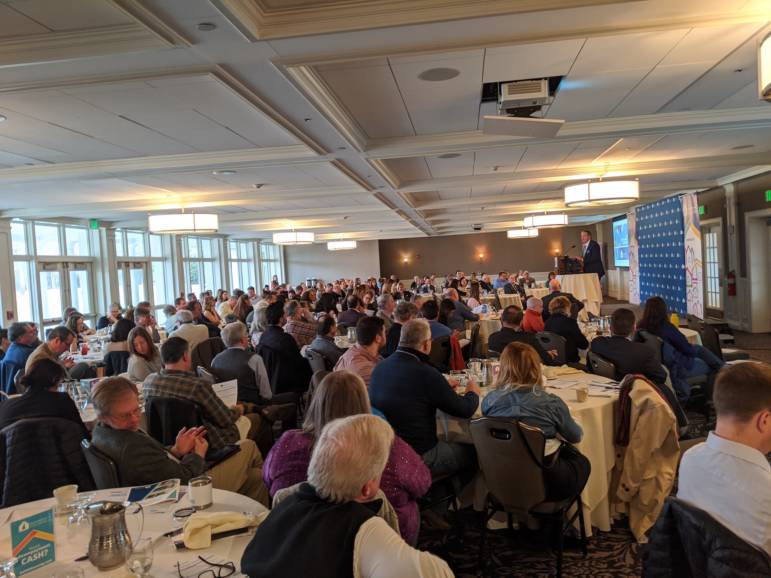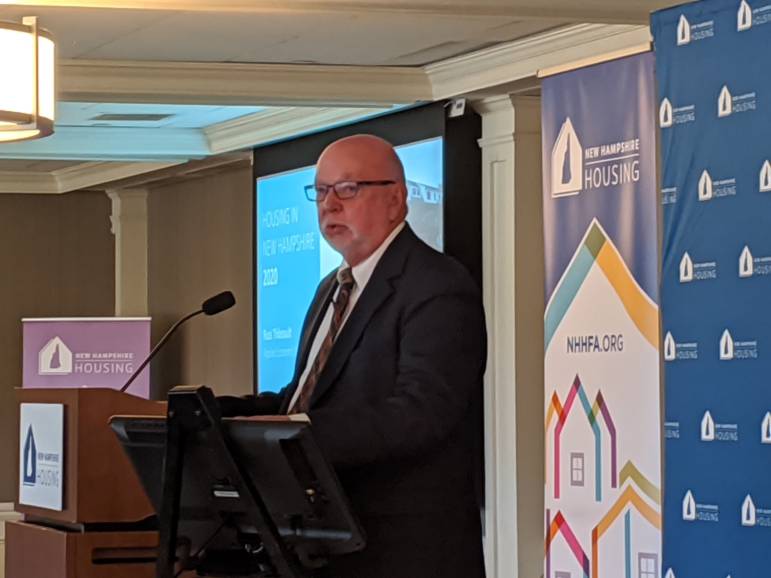
BEDFORD, NH – More than 200 real estate agents, developers, and housing advocates gathered on March 3 at the Manchester Country Club for New Hampshire Housing’s 2020 Homeownership Conference. At the top of everyone’s mind was the critically low inventory of homes for sale in the state. New Hampshire Housing’s March 2020 Housing Market Report indicates that the median sale price of a house in NH has reached $300,000, the inventory of houses for sale is critically low, and permits for new construction lag behind national rates. [Read the full report below.]
No Vacancy
Economist Russ Thibeault of Applied Economic Research presented a housing needs assessment to the audience. He noted that the New Hampshire economy is doing well. The state has added 68,000 new jobs since 2010, but the population has only grown by 40,000 people. The shortage of affordable housing is preventing people from moving to the state to take those jobs and is contributing to a slowing of economic growth. “If we want people to move here we need to have someplace to put them,” he stated.

Much of the country saw a severe decline in the number of permits issued for new housing construction during the recession. Since then the country as a whole has seen a slow but steady increase in the number of permits issued, but New Hampshire has remained relatively flat. Thibeault estimated that the state has a deficit of about 21,000 units.
The lack of new housing and rental vacancy rates under 1 percent have led to rising house prices and escalating rents. The median sales price of a home in New Hampshire reached a new high of $300,000 in June of 2019. Across the state 44 percent of renters are rent-burdened, which means they spend 30 percent or more of their income on rent. A whopping 90.8 percent of people making less than $20,000 a year are rent-burdened, 70 percent of renters making $20-$35,000 a year are also rent-burdened, and 49 percent of people making $35-$50,000 are rent-burdened.
“The pain is focused on low and moderate-income people,” said Thibeault.

According to Thibeault the winners in this scenario are landlords and baby boomers. Landlords because rents didn’t really drop during the recession, and boomers who are selling their homes in an extreme “sellers market”.
The prospects for homebuyers are equally challenging. Currently the inventory of homes for sale is about 2.2 months, meaning it would take about that long to sell all the homes on the market at the current rate of sales. This is historically low and it has led to rapid turnover.
“Homes are selling so fast we can barely plant the signs,” said Concord real estate broker Rachel Eames.
Eames went on to say that buyers have no leverage and are forced to take whatever they can find, even if it is not what they want. “Young first time homebuyers are finding themselves completely blocked out of the market. They are vying with downsizing boomers for the exact same properties. Everyone wants a ranch, but they have to settle for their second choice, a colonial.” she said

New homes need to match the market
Demographic predictions by the state of New Hampshire indicate that the state’s population of people under 65 will decline by 52,000 over the next 10 years while the population of people over 65 will increase by over 105,000.
The two largest groups driving the housing market will be first-time buyers age 35-44 and downsizers age 65-74. Thibeault suggested that neither group will be looking for 4-bedroom colonials on 5 acres. Builders should focus on homes with smaller footprints.
That is easier said than done. In many parts of the state zoning restrictions make it impossible to build small homes on small lots. To prove this point Thibeault showed a slide presentation of every house he ever lived in since childhood. Each one would be impossible to build in most New Hampshire towns.
Zoning regulations favor single-family homes on large lots. Under those conditions bigger, more expensive houses provide the greatest return on investment. As a response to the findings of the Governor’s Task Force on Housing changes proposed at the state level would allow towns to implement inclusionary zoning, which allows for a range of housing types including mixed-use buildings.
Small developers could help

John Anderson of the Incremental Development Alliance promotes small projects and infill development by small scale developers. Infill development is the process of developing vacant and under-used parcels of land in areas that are already largely developed.
Residents often distrust large scale developers because they fear that the character of their communities will be ruined or their property values will suffer. “You can’t condemn people for feeling that things that are important to them are at risk,” Anderson said. By cultivating small developers from within the communities it is possible to build trust with local planning boards and communities.
Small scale infill development provides opportunities to build the kind of smaller, more affordable units, in walkable areas that people are looking for. Anderson demonstrated how building smaller 1-4 unit apartment buildings as infill projects makes economic sense.
“If you can’t get the rent, you shouldn’t build the building” he said. He pointed out how construction costs for an infill duplex can be lower because water and sewer lines are already there. Builders also have more access to skilled tradesmen since they won’t be doing complicated installations like elevators or sprinkler systems. In the end the rent needed per square foot to get a return on the developer’s investment will be lower than for a larger, more complex building.
Anderson believes that small developers need to be cultivated. NH Housing will be holding a workshop and boot camp with Anderson in the coming months for people interested in learning more about becoming small scale developers.
For those considering buying a home, NH Housing will be offering a series of free Homebuyer Fairs this month. The Manchester event will be held on March 21 from 9 a.m. to 1 p.m. at the Executive Court Banquet Facility, 1199 South Mammoth Road, Manchester.
[googleapps domain=”drive” dir=”file/d/1dgyClbm3HyxUvgeD3GrIOWh5x14b_G15/preview” query=”” width=”640″ height=”480″ /]







